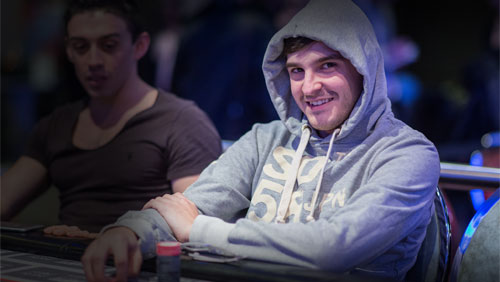Lee Davy sits down with the young UK hot shot, Leo McClean, to talk about his first year as a professional poker player; the ups, the downs, and the inevitable lessons learned.

“He’s a great lad. Finished third at EPT London for a huge score. Definitely worth an interview.” Said my colleague.
I did my research (meaning I looked his name up on Hendon Mob) and found that he had earned his way into the EPT Main Event in London, via an online satellite, and took home a quarter of a milly for finishing third.
Nice life.
This was a young man worth talking to.
Joe Bloggs went into the bin, I was about to meet Leo McClean.
I believe 2014 has been a good year for you.
“It started well. I came third in my first-ever EPT in London, but since then it’s been a rough 2014 to be honest.”
What was life like for you prior to that big win?
“I was working in a standard office job. Nine till six, every day, doing project management in the retail sector. I squeezed in some poker when I could. Then I won the package to the EPT Main Event. It definitely changed my life for the better.”
Remind me how much you won?
“Just under £250,000.”
Did you quit your job immediately?
“I worked for them for the next five months. They were a great company to work for. So I thought I would be fair to them. They let me have the time off I needed to play poker. I couldn’t fault them.”
Were you content in your job or disheartened with a dream to be a professional poker player?
“Playing professionally is always appealing for anyone that loves playing poker, but I was happy with my career. There were chances to move up; the money was good, and it was something I anticipated doing for a very long time. But in the back of your head there is always that dream to travel the world doing something you love. When I had the opportunity I had to take it. I hope I can continue to do it as often as possible.”
When you won the £250,000 did you turn pro on your own money?
“I started off on my own. Then I realized straight away that I was doing the wrong thing. I started to sell a lot of my action. Recently, I have only been having between 30% and 50% of my own action.”
What did you find so difficult about it?
“The expenses killed me. The buy-ins are a huge part of it, but the expenses double your outlay. If you sell pieces of yourself, you can cover your expenses, so you only have your tournament buy-in to worry about. I learned that pretty quickly, although I didn’t act on it that quickly. You live and learn. Now I have to take it more seriously; manage my bankroll better.”
Do you think you had visions of grandeur?
“I did get slightly carried away. I started playing all of the stops that I could. I was at every EPT and every event in the UK. It probably wasn’t wise. I did lose a lot. But I am starting to figure out how it works. I am selling pieces of myself at the right price. From now on I feel like I am in a right place for it.”
What was your game like during this time?
“When you are solely playing tournaments variance is involved, but you can’t just blame variance. I also stopped putting the work in. The last few months have been tough. I have learned a lot. I will get there eventually though. I feel it.”
Did you have a back up plan to go back to work if it all went Pete Tong?
“It was something I spoke to them about when I left. It was an option I had. I did think about it, and I think about it even today. You see people going broke all of the time. There isn’t longevity in this game for everyone. I have thought about it, and would go back to work if I had to. It wouldn’t phase me, but I would rather carry on doing this job.”
It’s not always glamorous is it?
“There are many times when I have been abroad and snap booked a flight home when I have been knocked out of an event. I don’t want to spew off money when my head is not straight. I love the game and so I can’t imagine I will get bored of the travelling. If that happens there are plenty of games in the UK.”
What would be your advice be to others wanting to make it professionally?
“If that’s what you really want to do, then keep plugging away. If it’s your dream, follow it. Never give up. People say it’s not all what it’s made out to be, and in some aspects it’s not, but if it’s your dream – follow it. Try satelliting into these main events. I am proof that it can work out.”